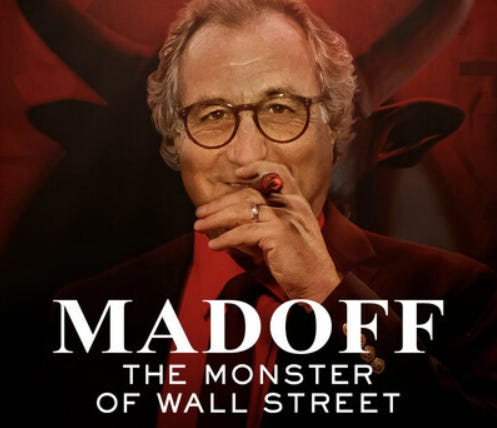The Horrifying Threat of Regulation
The Blockchain Sector 2023-02-09
In this newsletter I aim to explore the question of whether regulators are good or bad for the crypto industry.
On one side, their job is to clean up the industry, remove fraud, and make it a safer place to work, invest, and transact on a daily basis.
However, for some time, it has seemed that certain regulators, namely the Securities and Exchange Commission (SEC) in America, does not have aligned interests with market participants in the crypto industry.
We have seen time and again that the SEC, while having a mandate to protect individual investors, acts more as a body to protect financial institutions on Wall Street. This has led some to suggest that they are very closely aligned with those institutions.
I watched the "Madoff: The Monster of Wall Street" documentary on Netflix last week and it was incredible how much of a failure the regulators were in preventing those financial crimes. At one point, an independent analyst provided the SEC with a multi-page document outlining 30 red flags and compelling evidence as to why Madoff's fund was obviously a Ponzi scheme. However, the SEC failed to thoroughly investigate and the fraud went on for a number of years. It is not clear whether that was due to malicious intent and bribery or just the incompetence often seen in public organizations.
Either way, it is clear that we cannot rely on regulators in traditional finance or decentralized finance. In traditional finance, there is little choice but to trust these people. However, in decentralized finance, we have an alternative: the code is law. The essence of decentralized finance is financial transactions through trustless parties. We don't need to trust the fund manager to not be running a Ponzi scam or gambling away user deposits.
We have the code available, which allows us to see what we are invested in and understand it directly. This enables us to self-police as a communitiy and build trust within the DeFi sector.
The current blockchain industry is far from perfect. We saw with the Terra ecosystem how communities rallied around a product that was clearly built around Ponzi tokenomics. As a community we need to do more to promote the good players and discuss the risks of the bad players without fear of angry crypto twitter mob rebellions.
There is no doubt that regulation is coming to the crypto industry. The collapse of Terra and the fraud that took place at FTX and Alameda gave regulators great justification to launch legal action against any legal entity, founder or security.
We have seen, with Ripple, how this kind of overhanging litigation can destroy a product's momentum for multiple years. This is not something where the SEC launches a case and it is settled by the end of the week. If the SEC goes after a major DeFi protocol or layer one blockchain, it could take years to resolve. This overhanging litigation will have a negative impact on that project, no matter the outcome of the trial.
One important caveat to this, is truly decentralized protocols where there is no legal entity and no founders to persecute. These protocols are in a better position.
I hope I am being overly cynical here and that regulators can have a positive impact on the industry. There is certainly room for them to come in and clean up the space. If the SEC had any positive impact on preventing outright scams, phishing attacks, and malicious projects, it would be a case of all is forgiven. However, I think this is unlikely. It seems a far stretch to think that the SEC could actually have a positive impact on the industry, much in the same way that European privacy laws have not had a positive impact on the worldwide web.
I think the real question will be whether regulators focus on the low hanging fruit, which are the major projects with corporate entities that they can legislate against, or if they will go after more malicious projects with dangerous intentions that are hard to pursue.
For projects like UniSwap, Aave, Solana, Ethereum, and Cardano, they all have a targetable organization which could make it easier to target with legal action. However, these aren't the projects causing problems in the space. The phishing ads that you see pop up on Google ads, or fake websites that ask you to enter your seed phrase, are the types of practices that the SEC should be putting their attention towards cracking down on. But they probably don't have the technical expertise or inclination to go after these people who are actually damaging the industry and hurting consumers from the comfort of their office. It's much easier to draw up legal campaigns tying up the founders and developers of large cap projects that they can make an example of.
There is also a danger for centralized exchanges, who are just as at risk, if not more at risk, than DeFi. It seems likely that we start to see fines handed out to crypto exchanges, similar to how big banks have been fined billions of dollars for dealing with sanctioned parties in certain regions. It's likely that regulators will try to make a case against exchanges for not following KYC practices or anything else they want to focus on.
The truth is that no matter how ethical you run your project, if regulators want to come after you, they will find a way. This is something that all founders, developers, and stakeholders need to be aware of as we move into this uncertain regulatory future.
True decentralization solves this




